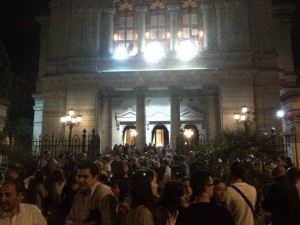#EyalGiladNaftali The Mourning of Italian Jewry
A strong wave of emotion ran through Italian Jewry this Monday when Eyal Yifrach, Gilad Shaar and Naftali Fraenkel, the three teens kidnapped, were found dead near Hebron. The announcement spread pretty quickly, even thanks to social media, and suddenly deleted the hope, until then so strong, to find them alive.
In the past weeks the concern and the anguish for the boys had dominated the consciousness and the public debate in the Italian Jewish world. The Synagogue of Rome hosted a crowded and moved prayer vigil for their liberation and in all the country the Jewish communities, from Milan to Florence, from Turin to Venice promoted prayers, reflections and meeting in the name of Eyal, Gilad and Naftali. When, less than one week ago, the grief and the mourning for their death replaced the hope, the Italian Jews choose again to share their feelings within the communities: as if the pain was unbearable in solitude.
The reaction of the Italian Jewry to the kidnapping and the assassination of Eyal, Gilad and Naftali was so deep, in many ways so more touched than that occurred elsewhere, that cannot be easy to realize. To better understand what emotions were at stake in these days you should consider how strong is the connection between the Italian Jewry and Israel. The short distance between the two countries (not more than three hours of flight), the fact that almost every Italian Jewish family has a relative and friends in Israel (and many also a second house), the frequent exchanges and common projects contribute to create a real familiar connection. And if you add the ideal values that always link the Jews to the Eretz Israel the picture is completed.
But to explain the collective dimension of that reaction we also have to consider that in Italy the anti-Israeli positions are widely spread across all the political spectrum. In that context even the dramatic kidnapping of the three boys often became a mere excuse to condemn Israel and its policy about the territories and the settlements. Therefore, it could be difficult to share the anguish on the public stage.
So, as said Renzo Gattegna, president of the Italian Jewish Communities “In front of the horror and the tragedy that has just profiled, we can do nothing else but share the pain in solidarity with the families of the victims. The images of the Italian and European synagogues crowded with people are in fact the strongest answer to our enemies and, in particular, to those who would impose, through hate, violence and terrorism, new social models not contemplated within a free and democratic world”.

